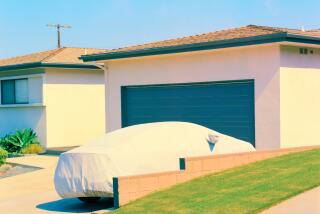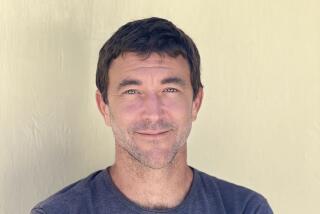PRIVATE FACES, PUBLIC SPACES : Goodby, Mr. (and Ms.) Chips
- Share via
In the wintry afternoon sun, a round berry of a man sits on a schoolyard bench. Children stand close to him. He draws them to him, this soft, balding man in his button-down shirt, elegant gray flannels, silk tie and suspenders. He has sat this way in the pale school afternoons for years.
The children around him present a grim picture: heavy, blank-faced, huge for their age, or small and too wiry. Shoes are battered, clothes flimsy. In the world outside the fence, a smile is not currency, charm not a prized commodity. They have learned to melt into concrete, to withdraw all sign of spirit or life. They are 11, 12 maybe. And the kind Pickwick on the bench has taught them algebra, genetics, energy.
Lionel Abrahams is leaving Hobart. The district gave him early retirement and three days’ notice. Years of friendship, service, devotion, poetry books and treasures to pack up and pass on. Yet another farewell for children who have seen families killed in war, a succession of furnished rooms, the expendability of being poor.
Nearby, Eleanor Warren stands by the clothesline that is Hobart’s “volleyball net,” the sum total of its sports’ facilities. And yet with Ellie Warren, tall, imperious, the ironclad spirit of the Bronx still about her, these children have read poetry, studied the great Western civilizations, the mystery of art. They tell the story of Warren’s sixth-graders on their first visit to a museum: As prim docents blanched at the sight of this ragged band, a voice piped up: “Look, a Rubens. It’s Baroque. See the diagonal lines on the canvas. . . . “
These are the children--Spanish-speaking, the children of welfare, the free-lunch children--dismissed as “poor,” as “dangerous.” When they look around, they see themselves everywhere--busboys, gardeners, domestics, pumping gas in cold, threatening nights.
They shoulder so much, these girls and boys whose mothers were murdered in El Salvador, whose lives are measured by exhaustion, despair, fear of hunger, eviction, violence. They shoulder so much, the Abrahamses and Warrens of Hobart. They all give to the “shoe fund” to buy clothes for the neediest, shivering in the bleak mornings. One teacher paid a family’s rent: “What could I do? They were going to be thrown out.”
A boy went to the nurse: His face had been slashed on the way to school. She drove him to the county hospital; it was overcrowded. She drove him to a private clinic, and paid $345 from her own pocket for 20 stitches. No insurance, no refunds. The doctor would not treat the boy otherwise. Twenty, 30 minutes to stem the bleeding, to stitch up his face. Whose is the humane vocation, whose the calloused heart?
For years, Lionel Abrahams has driven 50 miles in the winter dark to get to school by 6:30 to answer the office phone for Spanish-speaking parents, to soothe, advise, listen, worry. “It helps,” he shrugs. When he grew up in Panama, one of 12 children, it was taken for granted that they would somehow go to college. He washed floors, he cleaned toilets--he graduated. How many of Hobart’s children are brought up with the same faith?
“You have to keep telling them they’re wonderful,” says Abrahams. “You have to keep telling them they’re unique, they can make it, they can go to college. They can succeed.” And some do; they come back, in their suede shoes and beige linen, to give thanks, to remember how long was the journey. And some never return; they perish, they vanish into the streets.
Here is Lionel Abrahams, his kind, loving face, sorrowing as he goes through his shelves--ah, the Tennyson! And in the heart of Olympic Boulevard, in a school that survives as schools do in wartime, through grit and constant improvisation, this gentle man once from Panama recites the words of Alfred, Lord Tennyson, raised in a green, imperial land:
I am a part of all that I have met;
Yet all experience is an arch wherethrough
Gleams that untravel’d world whose margin fades
For ever and for ever when I move.
More to Read
The biggest entertainment stories
Get our big stories about Hollywood, film, television, music, arts, culture and more right in your inbox as soon as they publish.
You may occasionally receive promotional content from the Los Angeles Times.










